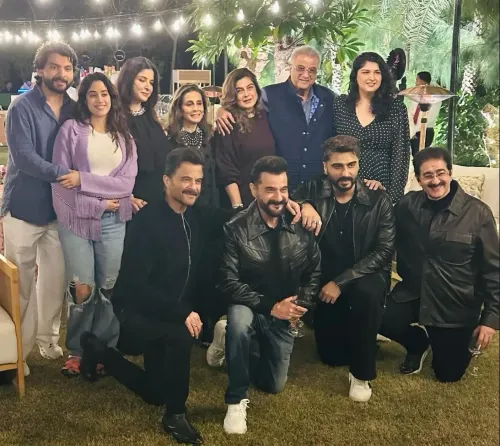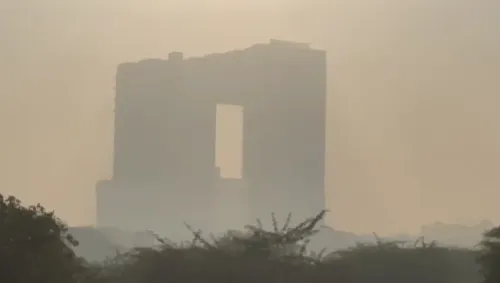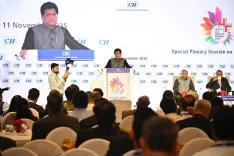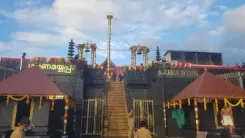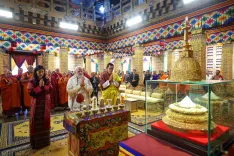Should Bharat Rise and Establish Itself as a Nation of Dharma?

Synopsis
Key Takeaways
- Bharat must rise as a nation of Dharma.
- Unity among diverse communities is essential.
- Awareness is the first step towards building a Hindu society.
- Historical divisions need to be addressed through dialogue.
- Positive contributions in society outweigh negative occurrences.
Bengaluru, Nov 9 (NationPress) The chief of Rashtriya Swayamsevak Sangh (RSS), Mohan Bhagwat, has emphasized that Bharat must ascend and position itself as a nation rooted in Dharma.
During a lecture series marking the centenary of the RSS in Bengaluru, he remarked that countries globally define their own 'swadharma', aiming to foster prosperity for their citizens while contributing positively to humanity.
“This is essential. What does this signify for 100 years of the Sangh? The inaugural step towards building a Hindu society is to cultivate awareness. This task remains incomplete. We must broaden our outreach. Thus, in this centenary year, our primary focus is to extend our efforts to every village and community,” he articulated during his second session lecture.
“We view Hindu society as a singular entity. It is imperative to connect with every diverse segment and organize the entire Hindu populace — all 142 crore individuals, encompassing a multitude of religious affiliations, including some introduced historically from outside,” Bhagwat noted.
“We have initiated dialogues with individuals who do not identify as Hindu. Some claim they are not Hindus but Hindavi. Others identify as Indic people. We recognize these terms as synonyms,” he added.
“The term 'Hindu' is significant as it embodies the essence — the core. 'Hindu' is not confined to any particular form; it is inclusive. We must advance the organization’s mission and cultivate individuals who embody these principles. Merely having ideals isn't sufficient — they serve as guiding stars: we can admire them, yet we may never reach them,” he explained.
“We possess numerous ideals, but we require tangible examples. Our goal is to establish a network among individuals contributing to the nation in their unique ways. The vastness of our country often leaves us unaware of various happenings. The media frequently overlooks the positive developments occurring,” he expressed.
“In reality, at least forty times more good is being accomplished in our nation compared to the negative. Hence, this is a period of goodness — the era of negativity has passed,” he asserted.
“The Bharat of our aspirations must materialize — however, this necessitates the right mindset. We aim to kickstart nationwide conversations and discussions. This mindset and long-term planning must permeate from individual levels to policymaking,” he urged.
“We have all been nurtured within a colonial framework. As a society, we must unite to transcend it. Society must operate with goodwill, harmony, and positivity. There is excessive negative discourse,” he remarked.
“We are disseminating this message to caste and religious leaders at the block level, urging them to consider the upliftment of the marginalized within their communities. No one should be able to instigate discord within society. This is integral to our strategy,” he stated.
“Regrettably, there was no division in Bharat before the British invasion. Islam arrived with aggressors — that’s acceptable — the invaders retreated, but the Muslims who remained here became Bharatiyas. The process of assimilation persisted,” he observed.
“However, during Aurangzeb's reign, attempts were made to reverse this process. He ultimately failed, and the assimilation process resumed. In 1857, Muslims and Hindus united against the British. To foster solidarity, cow slaughter was prohibited,” he stated.
“The Ram Janmabhoomi issue was resolved. The Hindus and Muslims of Ayodhya collectively decided it should belong to the Hindus. This unity alarmed the British. They identified all societal fault lines and sought to exacerbate them, causing lasting damage that perpetuates discord,” he remarked.
“Today, we stand free. Yet, the remnants of those times continue to cast a negative shadow. The echoes of past divisions still wreak havoc. We must convene, converse, and resolve these issues,” he urged.
“This realization must dawn upon minds that, for two centuries, have been conditioned towards separateness. This division was a deliberate strategy to fracture us. If we overlook this, division will persist,” he cautioned.
“Why do these conflicts arise? Either due to the dwindling Hindu population or a weakening of the Hindu spirit. We must educate these segments as well. We have initiated such dialogues,” he revealed.
“What has transpired is in the past. We are one community — let us begin anew,” he appealed.
“What constitutes the life mission of a Hindu nation?” Bhagwat inquired. “Swami Vivekananda stated that every nation has a message to convey and a mission to fulfill. Bharat too has a mission — to impart Dharma to the world.”
“We are regarded as a Dharma-prana nation. Dharma is often misunderstood as religion. Religion differs; it encompasses dos and don'ts — pathways to truth or God,” he clarified.
“The truth is expansive and awe-inspiring, and naturally, there exist numerous routes to access it. Dharma represents the essence of existence, our obligations. It is also perceived as the middle path — extremism is shunned in Dharma. All extremes are avoided within its framework,” he elucidated.
“Furthermore, Dharma can be interpreted as discipline — leading a life without disturbing others, while introspecting — this encapsulates the essence of Buddha’s Dharma. Dharma also signifies that which sustains,” he stated.
“As a Bharatiya, I assert that for our nation to thrive, we require Dharma. But who genuinely seeks Dharma? To answer that, we must comprehend the present global landscape. The world has progressed significantly, especially with scientific advancements,” he noted.
“Every human endeavor is directed towards fostering happiness. In ancient epochs, wars were prevalent, and conflict persisted. The First World War devastated many aspects. The League of Nations was established to prevent wars, yet the Second World War occurred nonetheless,” he remarked.
“The United Nations remains operational, yet warfare continues. Conflicts endure. The world’s arsenal possesses the capability to obliterate ten such worlds. This limited perspective — perceiving differences as separations — is the crux of the issue. Despite extensive contemplation, old dilemmas persist and new ones arise,” Bhagwat stated.
“Some denied the existence of God, while others claimed God's supremacy. Every ideology was explored, and now societies have realized something was amiss. When communities are subjected to stringent discipline, individual freedoms are curtailed,” he observed.
“While the world stagnated, we did not. We encountered no wars or aggressions due to the Himalayas,” he remarked.
“Dharma represents equilibrium — for all and everything. Humanity must learn to coexist and relinquish control. The tenets of Dharma must once again be offered to the world, as it is in turmoil,” he asserted.
“We are among the oldest civilizations. We must enlighten humanity — not through preaching, but through practice. Our ancestors did this. They traversed the globe on foot. They neither pillaged nor converted; they exchanged knowledge and received wisdom in return. The time has come for us to resume this journey,” Mohan Bhagwat concluded.


